Complexity of Commerce Discussants: Difference between revisions
From Santa Fe Institute Events Wiki
| Line 24: | Line 24: | ||
[[File: Brian-Arthur.jpg|thumb|200px|[https://www.santafe.edu/people/profile/w-brian-arthur '''Brian Arthur''']<br/>'''PARC and Santa Fe Institute''']] | [[File: Brian-Arthur.jpg|thumb|200px|[https://www.santafe.edu/people/profile/w-brian-arthur '''Brian Arthur''']<br/>'''PARC and Santa Fe Institute''']] | ||
'''Brian Arthur''' is External Professor at the Santa Fe Institute, and Visiting Researcher in the Systems Sciences Lab at PARC (formerly Xerox Parc) in Palo Alto. Arthur pioneered the modern study of positive feedbacks or increasing returns in the economy--in particular their role in magnifying small, random events in the economy and locking in dominant players. This work has gone on to become the basis of our understanding of the high-tech economy. In 2009 he published the book "The Nature of Technology: What it Is and How it Evolves", an elegant and powerful theory of technology's origins and evolution.<br/><br/>Arthur is also one of the pioneers of the science of complexity. His association with the Santa Fe Institute goes back to 1987. He is a member of SFI's Founders Society, and in 1988 directed its first research program—work that has subsequently become the basis for Complexity Economics. He has served many years on SFI's Science Board and Board of Trustees. From 1983 to 1996 Arthur was Morrison Professor of Economics and Population Studies at Stanford University, at the time of appointment the youngest endowed professor at Stanford.<br/><br/>Brian Arthur is the recipient of the Schumpeter Prize in economics, the Lagrange Prize in complexity science, and two honorary doctorates. He earned his Ph.D. from Berkeley in Operations Research and has other degrees in economics, electrical engineering, and mathematics. | '''Brian Arthur''' is External Professor at the Santa Fe Institute, and Visiting Researcher in the Systems Sciences Lab at PARC (formerly Xerox Parc) in Palo Alto. Arthur pioneered the modern study of positive feedbacks or increasing returns in the economy--in particular their role in magnifying small, random events in the economy and locking in dominant players. This work has gone on to become the basis of our understanding of the high-tech economy. In 2009 he published the book "The Nature of Technology: What it Is and How it Evolves", an elegant and powerful theory of technology's origins and evolution.<br/><br/>Arthur is also one of the pioneers of the science of complexity. His association with the Santa Fe Institute goes back to 1987. He is a member of SFI's Founders Society, and in 1988 directed its first research program—work that has subsequently become the basis for Complexity Economics. He has served many years on SFI's Science Board and Board of Trustees. From 1983 to 1996 Arthur was Morrison Professor of Economics and Population Studies at Stanford University, at the time of appointment the youngest endowed professor at Stanford.<br/><br/>Brian Arthur is the recipient of the Schumpeter Prize in economics, the Lagrange Prize in complexity science, and two honorary doctorates. He earned his Ph.D. from Berkeley in Operations Research and has other degrees in economics, electrical engineering, and mathematics. | ||
<div style="clear: both;"></div> | |||
<hr/> | |||
[[File: |thumb|200px|[https://sonic.northwestern.edu/people/noshir-contractor/ '''Noshir Contractor''']<br/>'''Northwestern University''']] | |||
'''Noshir Contractor''' is the Jane S. & William J. White Professor of Behavioral Sciences in the McCormick School of Engineering & Applied Science, the School of Communication and the Kellogg School of Management at Northwestern University, USA. He is the Director of the Science of Networks in Communities (SONIC) Research Group at Northwestern University. He is investigating factors that lead to the formation, maintenance, and dissolution of dynamically linked social and knowledge networks in a wide variety of contexts including communities of practice in business, translational science and engineering communities, public health networks and virtual worlds. His research program has been funded continuously for over 20 years by major grants from the U.S. National Science Foundation with additional funding from the U.S. National Institutes of Health (NIH), NASA, DARPA, Air Force Research Lab, Army Research Institute, Army Research Laboratory, Army Research Office, Bill & Melinda Gates Foundation, Rockefeller Foundation and the MacArthur Foundation. | |||
<div style="clear: both;"></div> | <div style="clear: both;"></div> | ||
<hr/> | <hr/> | ||
| Line 45: | Line 50: | ||
'''Geoffrey West''' is the Shannan Distinguished Professor and former President of the Santa Fe Institute and Associate Senior Fellow of Oxford University’s Green-Templeton College. His BA is from Cambridge and his PhD from Stanford, where he later returned to join the faculty. West is a theoretical physicist whose primary interests have been in fundamental questions ranging from the elementary particles and their cosmological implications to universal scaling laws in biology and a quantitative science of cities, companies and global sustainability. His work is motivated by the search for “simplicity underlying complexity.” His research includes metabolism, growth, aging and lifespan, sleep, cancer and ecosystems, the dynamics of cities and companies, rates of growth and innovation, and the accelerating pace of life.<br/><br/>West has given many lectures world-wide including Davos and TED. Among his awards are the Mercer Prize from the Ecological Society of America, the Weldon Prize for Mathematical Biology, the Glenn Award for Aging Research and the Szilard Award from the American Physical Society. He has been featured in many publications world-wide including the ''New York Times'', ''Financial Times'', ''Wired'', ''Time'', ''The Economist'', ''Nature'' and ''Science'' and participated in television productions including ''Nova'', ''National Geographic'' and ''BBC''. He is the author of the best-selling book ''Scale''. His public service includes serving on the Council of the World Economic Forum. His work was selected as a breakthrough idea by the ''Harvard Business Review'' in 2006 and he was on ''Time'' magazine’s list of “100 Most Influential People in the World” in 2007. | '''Geoffrey West''' is the Shannan Distinguished Professor and former President of the Santa Fe Institute and Associate Senior Fellow of Oxford University’s Green-Templeton College. His BA is from Cambridge and his PhD from Stanford, where he later returned to join the faculty. West is a theoretical physicist whose primary interests have been in fundamental questions ranging from the elementary particles and their cosmological implications to universal scaling laws in biology and a quantitative science of cities, companies and global sustainability. His work is motivated by the search for “simplicity underlying complexity.” His research includes metabolism, growth, aging and lifespan, sleep, cancer and ecosystems, the dynamics of cities and companies, rates of growth and innovation, and the accelerating pace of life.<br/><br/>West has given many lectures world-wide including Davos and TED. Among his awards are the Mercer Prize from the Ecological Society of America, the Weldon Prize for Mathematical Biology, the Glenn Award for Aging Research and the Szilard Award from the American Physical Society. He has been featured in many publications world-wide including the ''New York Times'', ''Financial Times'', ''Wired'', ''Time'', ''The Economist'', ''Nature'' and ''Science'' and participated in television productions including ''Nova'', ''National Geographic'' and ''BBC''. He is the author of the best-selling book ''Scale''. His public service includes serving on the Council of the World Economic Forum. His work was selected as a breakthrough idea by the ''Harvard Business Review'' in 2006 and he was on ''Time'' magazine’s list of “100 Most Influential People in the World” in 2007. | ||
<div style="clear: both;"></div> | <div style="clear: both;"></div> | ||
==<span style="color:#d15a2a"> Discussants Include:</span>== | ==<span style="color:#d15a2a"> Discussants Include:</span>== | ||
Revision as of 22:56, 13 August 2019
SFI ACtioN Topical Meeting
September 12, 2019
Shopify Kit Office
33 New Montgomery St #750
San Francisco, CA 95104
Faculty Include:
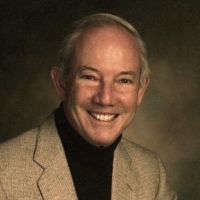
PARC and Santa Fe Institute
Brian Arthur is External Professor at the Santa Fe Institute, and Visiting Researcher in the Systems Sciences Lab at PARC (formerly Xerox Parc) in Palo Alto. Arthur pioneered the modern study of positive feedbacks or increasing returns in the economy--in particular their role in magnifying small, random events in the economy and locking in dominant players. This work has gone on to become the basis of our understanding of the high-tech economy. In 2009 he published the book "The Nature of Technology: What it Is and How it Evolves", an elegant and powerful theory of technology's origins and evolution.
Arthur is also one of the pioneers of the science of complexity. His association with the Santa Fe Institute goes back to 1987. He is a member of SFI's Founders Society, and in 1988 directed its first research program—work that has subsequently become the basis for Complexity Economics. He has served many years on SFI's Science Board and Board of Trustees. From 1983 to 1996 Arthur was Morrison Professor of Economics and Population Studies at Stanford University, at the time of appointment the youngest endowed professor at Stanford.
Brian Arthur is the recipient of the Schumpeter Prize in economics, the Lagrange Prize in complexity science, and two honorary doctorates. He earned his Ph.D. from Berkeley in Operations Research and has other degrees in economics, electrical engineering, and mathematics.
[[File: |thumb|200px|Noshir Contractor
Northwestern University]]
Noshir Contractor is the Jane S. & William J. White Professor of Behavioral Sciences in the McCormick School of Engineering & Applied Science, the School of Communication and the Kellogg School of Management at Northwestern University, USA. He is the Director of the Science of Networks in Communities (SONIC) Research Group at Northwestern University. He is investigating factors that lead to the formation, maintenance, and dissolution of dynamically linked social and knowledge networks in a wide variety of contexts including communities of practice in business, translational science and engineering communities, public health networks and virtual worlds. His research program has been funded continuously for over 20 years by major grants from the U.S. National Science Foundation with additional funding from the U.S. National Institutes of Health (NIH), NASA, DARPA, Air Force Research Lab, Army Research Institute, Army Research Laboratory, Army Research Office, Bill & Melinda Gates Foundation, Rockefeller Foundation and the MacArthur Foundation.
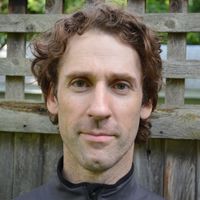
University of Vermont
Peter Dodds is a Professor at the University of Vermont (UVM) working on system-level problems in many fields, ranging from sociology to physics. He is Director of the UVM's Complex Systems Center, co-Director of UVM's Computational Story Lab, and a visiting faculty fellow at the Vermont Advanced Computing Core. He maintains general research and teaching interests in complex systems and networks with a current focus on sociotechnical and psychological phenomena including collective emotional states, contagion, language, and stories. His methods encompass large-scale sociotechnical experiments, large-scale data collection and analysis, and the formulation, analysis, and simulation of theoretical models. Dodds's training is in theoretical physics, mathematics, and electrical engineering with extensive formal postdoctoral and research experience in the social sciences. Dodds has received funding from NSF, NASA, ONR, and the MITRE Corporation, among others, notably being awarded an NSF CAREER by the Social and Economic Sciences Directorate.

Santa Fe Institute
Mirta Galesic is Professor and Cowan Chair in Human Social Dynamics at the Santa Fe Institute, External Faculty at the Complexity Science Hub in Vienna, Austria, and Associate Researcher at the Harding Center for Risk Literacy at the Max Planck Institute for Human Development in Berlin, Germany.
She studies how simple cognitive mechanisms interact with properties of the external environment to produce seemingly complex social phenomena. In one line of research, she investigates how apparent cognitive biases in social judgments emerge as a product of the interplay of well-adapted minds and the statistical structure of social environments. In another, she studies how collective performance depend on the interaction of group decision strategies and network structures. A third line of research investigates opinion dynamics in real-world societies using cognitively-enriched models from statistical physics. And, she studies how people understand and cope with uncertainty and complexity inherent in many everyday decisions.
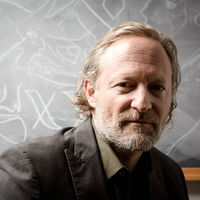
Santa Fe Institute
David Krakauer is the President and William H. Miller Professor of Complex Systems at Santa Fe Institute. His research explores the evolution of intelligence on earth. This includes studying the evolution of genetic, neural, linguistic, social and cultural mechanisms supporting memory and information processing, and exploring their shared properties. He served as the founding Director of the Wisconsin Institute for Discovery, the Co-Director of the Center for Complexity and Collective Computation, and Professor of mathematical genetics all at the University of Wisconsin, Madison. David has been a visiting fellow at the Genomics Frontiers Institute at the University of Pennsylvania, a Sage Fellow at the Sage Center for the Study of the Mind at the University of Santa Barbara, a long-term Fellow of the Institute for Advanced Study in Princeton, and visiting Professor of Evolution at Princeton University. In 2012 Dr. Krakauer was included in the Wired Magazine Smart List as one of 50 people "who will change the World.” In 2016 Krakauer was included in Entrepreneur Magazine’s visionary Leaders advancing global research and business.
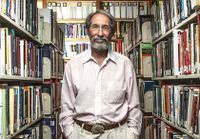
Santa Fe Institute
Geoffrey West is the Shannan Distinguished Professor and former President of the Santa Fe Institute and Associate Senior Fellow of Oxford University’s Green-Templeton College. His BA is from Cambridge and his PhD from Stanford, where he later returned to join the faculty. West is a theoretical physicist whose primary interests have been in fundamental questions ranging from the elementary particles and their cosmological implications to universal scaling laws in biology and a quantitative science of cities, companies and global sustainability. His work is motivated by the search for “simplicity underlying complexity.” His research includes metabolism, growth, aging and lifespan, sleep, cancer and ecosystems, the dynamics of cities and companies, rates of growth and innovation, and the accelerating pace of life.
West has given many lectures world-wide including Davos and TED. Among his awards are the Mercer Prize from the Ecological Society of America, the Weldon Prize for Mathematical Biology, the Glenn Award for Aging Research and the Szilard Award from the American Physical Society. He has been featured in many publications world-wide including the New York Times, Financial Times, Wired, Time, The Economist, Nature and Science and participated in television productions including Nova, National Geographic and BBC. He is the author of the best-selling book Scale. His public service includes serving on the Council of the World Economic Forum. His work was selected as a breakthrough idea by the Harvard Business Review in 2006 and he was on Time magazine’s list of “100 Most Influential People in the World” in 2007.
Discussants Include:
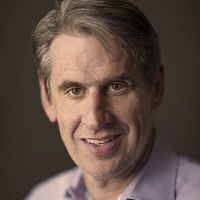
Benchmark Capital and Santa Fe Institute
Bill Gurley is a General Partner at Benchmark, joining in 1999, and a trustee of the Santa Fe Institute. Over his venture career, he has invested in and served on the board of such companies as Jamdat (IPO: JMDT, Acq. by EA), GrubHub (IPO: GRUB), Nextdoor, OpenTable (IPO: OPEN, Acq. by Priceline), Stitch Fix, Uber (IPO: UBER), and Zillow.com (IPO: Z). Before entering the venture capital business, Bill spent four years on Wall Street as an Institutional Investor ranked research analyst, including three years at Credit Suisse First Boston. He also worked as the lead analyst on Amazon's IPO. Prior to his finance career, he worked as a computer engineer at Compaq in Houston. Bill received his BS in computer science from the University of Florida, and an MBA from the University of Texas. He is also a Chartered Financial Analyst. He and his wife are active supporters of the Opportunity Fund and KIPP Bay Area. Bill also maintains a blog on the evolution and economics of high technology businesses called Above the Crowd, and can be followed on Twitter at @bgurley.
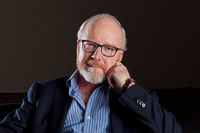
Deloitte and Santa Fe Institute
John Hagel is the Founder and Co-Chairman of Deloitte's Center for the Edge and a trustee of the Santa Fe Institute. The charter of the Center for the Edge is to identify emerging business opportunities that are not yet on the CEO’s agenda, but should be, and to do the research required to persuade them to put it on their agenda. He also works with clients to help them get more impact as they pursue these opportunities.
He has spent over 35 years in Silicon Valley and has experience as a management consultant, entrepreneur, speaker and author. He is driven by a desire to help individuals and institutions around the world to increase their impact in a rapidly changing world.
In addition to his current role as leader of the Center for the Edge at Deloitte, he has worked with McKinsey & Co. and Boston Consulting Group. He also served as senior vice president of strategy at Atari, Inc., and is the founder of two Silicon Valley startups.
He currently occupies leadership roles at the World Economic Forum and the Santa Fe Institute. He is the author of seven books on business and society and is in the process of completing his eighth book.

SurveyMonkey
Tom Hale is the President of SurveyMonkey. Tom joined SurveyMonkey in July 2016 and oversees engineering, infrastructure, product, product marketing, user experience and growth, including international expansion. Before SurveyMonkey, he spent six years at HomeAway, first as Chief Product Officer, then as Chief Operating Officer, leading the company through IPO and acquisition by Expedia. Tom also served as Linden Lab’s Chief Product Officer where he redesigned the consumer experience of Second Life. Prior to that, he spent a decade at Macromedia and Adobe in various executive roles in general management, product management, and marketing. Tom sits on the board of Cars.com and holds an AB from Harvard University.

Skipjack Global Capital Management
Gibboney Huske is the Co-Founder and CIO of Skipjack Global Capital Management. Gibboney previously co-managed ClearBridge Global Growth Trust (LMGNX) from 2012 to 2015. At the time of her departure, the fund was top rated by Lipper and rated 5 stars by Morningstar. Ms. Huske worked for Legg Mason Capital Management (LMCM) under Bill Miller, who was named Fund Manager of the Decade by Morningstar.com. She worked as an Analyst and Portfolio Manager from 2005 to its assumption by Clearbridge in 2013. She worked for Clearbridge until 2015. She led the TMT team and efforts to globalize research. She worked to convert the former Growth Trust mutual fund from a U.S. to a global focus. Prior to LMCM, she was a sell-side analyst working for Credit Suisse covering the Software and Imaging sectors where she was ranked as an Institutional Investor All American Analyst. Ms. Huske is a 1997 graduate of the Darden School of Business at the University of Virginia and a 1991 graduate of the McIntire School of Commerce at the University of Virginia.
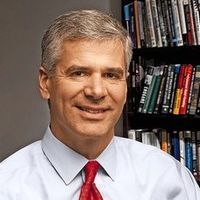
BlueMountain Capital Management and Santa Fe Institute
Michael Mauboussin is Director of Research at BlueMountain Capital Management in New York and a trustee of the Santa Fe Institute. Prior to joining BlueMountain in July of 2017, he was a Managing Director and Head of Global Financial Strategies at Credit Suisse.
Before rejoining Credit Suisse, he was Chief Investment Strategist at Legg Mason Capital Management from 2004-2012. Mr. Mauboussin originally joined Credit Suisse in 1992 as a packaged food industry analyst and was named Chief U.S. Investment Strategist in 1999. He is a former president of the Consumer Analyst Group of New York and was repeatedly named to Institutional Investor's All-America Research Team and The Wall Street Journal All-Star survey in the food industry group.
Mr. Mauboussin is the author of The Success Equation: Untangling Skill and Luck in Business, Sports, andInvesting, Think Twice: Harnessing the Power of Counterintuition, and More Than You Know: Finding Financial Wisdom in Unconventional Places-Updated and Expanded. He is also co-author, with Alfred Rappaport, of Expectations Investing: Reading Stock Prices for Better Returns.
Mr. Mauboussin has been an adjunct professor of finance at Columbia Business School since 1993 and is on the faculty of the Heilbrunn Center for Graham and Dodd Investing. He earned an A.B. from Georgetown University.

Sandia Holdings, McKinnon Family Foundation and Santa Fe Institute
Ian McKinnon is the founding partner of Sandia Holdings, LLC (“Sandia”) and a trustee of the Santa Fe institute. Located in Greenwich, Conn., Sandia is the primary investment vehicle for the McKinnon family and related entities. Prior to starting Sandia, McKinnon spent nearly 20 years at Ziff Brothers Investments (“ZBI”), from which he retired as a Managing Partner. Before joining ZBI, McKinnon was a consultant with Bain & Company and an investment banking analyst with Merrill Lynch & Co.
Mr. McKinnon received an M.B.A. from Harvard Business School as a Baker Scholar, and graduated summa cum laude and Phi Beta Kappa from Occidental College with a B.A. in Public Policy. He was also a finalist for both the Rhodes and Marshall scholarships.

Insight Venture Partners and Santa Fe Institute
Jerry Murdock is a co-founder of Insight Venture Partners and a trustee of the Santa Fe Institute. He has invested in many startups like Twitter, Snapchat, Nest, Flipboard, and Docker. Murdock also serves as a member on the Board of Trustees for the the Aspen Center for Environmental Studies and the Aspen Institute.
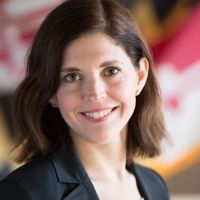
Skipjack Global Capital Management
Noelle Savage is co-Founder and President of Skipjack Global Capital Management, where she has been since its inception in 2015. She previously worked as a Managing Director with Atlas Diligence, a research services provider focused on private capital opportunities. Joining the firm in 2011 just months after its formation, she assisted in building Atlas’s products and services, including the firm’s proprietary private equity manager research platform, as well as leading research and due diligence efforts on private capital investment opportunities. In 2014 Atlas Diligence was sold to RCP Advisors, an independent sponsor of private equity fund-of-funds, secondary funds, and co-investment funds. Prior to joining Atlas Diligence, Noelle spent five years with mutual fund manager Legg Mason Capital Management (LMCM), a subsidiary of global asset management company Legg Mason. During her time at LMCM, Noelle was a member of the group’s research team. She most recently served as a Research Analyst, covering stocks within the technology industry. Noelle graduated magna cum laude from Washington and Lee University with a BS in Mathematics. She spent several years teaching high school mathematics before starting her career in asset management.

Shopify and Santa Fe Institute
Toby Shannan is the Chief Support Officer at Shopify, where he has been since 2010, and a trustee of the Santa Fe Institute. In his current role with Shopify, he oversees the customer service strategy for Shopify. Having made its way from startup to a $5.2B valuation in just nine years, Shopify is now the world’s leading cloud-based, multi-channel commerce platform. Shopify software allows merchandisers of all sizes to design, set up, and manage their stores across multiple sales channels, including web, mobile, social media, marketplaces, brick-and-mortar locations, and pop-up shops. Headquartered in Ottawa, Canada, Shopify currently powers over 600,000 businesses in approximately 175 countries and is trusted by brands such as Red Bull, Nestle, Rebecca Minkoff, Kylie Cosmetics, and many more.
Prior to joining Shopify, Toby co-founded and was the acting Chief Executive Officer of Social Fabric, a personal genomics company, and served as Vice President of Sales and Marketing at DNA Genotek from 2003 to 2007. Shopify has been a member of the Institute’s Applied Complexity Network (ACtioN) since 2017.

Hal Varian is the chief economist at Google. Since 2002 he has been involved in many aspects of the company, including auction design, econometric analysis, finance, corporate strategy and public policy. Hal also holds academic appointments at the University of California, Berkeley in three departments: business, economics, and information management.
Hal is a fellow of the Guggenheim Foundation, the Econometric Society, and the American Academy of Arts and Sciences. He was co-editor of the American Economic Review from 1987-1990 and holds honorary doctorates from the University of Oulu, Finland and the University of Karlsruhe, Germany.
He has published numerous papers in economic theory, industrial organization, financial economics, econometrics and information economics. He is the author of two major economics textbooks which have been translated into 22 languages. He is the co-author of a bestselling book on business strategy, Information Rules: A Strategic Guide to the Network Economy and wrote a monthly column for the New York Times from 2000 to 2007.
Fellows Include:
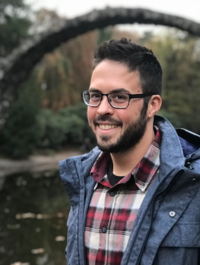
Santa Fe Institute
Joshua Garland is an Applied Complexity Fellow at the Santa Fe Institute. Josh received his Ph.D. from the University of Colorado, supervised by Elizabeth Bradley, introducing a new paradigm in delay-coordinate reconstruction theory. Prior to that, he earned an M.S. in Applied Mathematics also from the University of Colorado, constructing dynamical models of computer performance and a dual B.S. in Mathematics and Computer Science from Colorado Mesa University. Joshua also served as an SFI Omidyar Postdoctoral Fellow from 2016 to 2019. In the study of complex adaptive systems, the available data often falls far short of the demands of the theory. Joshua’s work focuses on understanding how much information is present in the data, how to extract it, to understand it, and to use it—but not overuse it. Specifically, Joshua is working toward developing a parsimonious reconstruction theory for nonlinear dynamical systems. In addition, he aims to leverage information mechanics (e.g., production, storage and transmission) to gain insight into important yet imperfect systems, like the climate, traded financial markets and the human heart. Joshua’s hope is this combination of new mathematical theory, analysis, and application can eventually shed a little more light on universalities like emergence, regime shifts, and phase transitions.
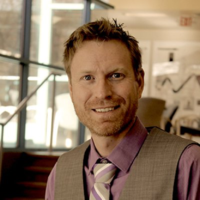
Santa Fe Institute
Mike Price is an Applied Complexity Fellow at the Santa Fe Institute. Mike earned his Ph.D. in Anthropology from Stanford University and was a Post- doctoral Researcher at Pennsylvania State University. Prior to that he earned a B.S. in Physics from Harvey Mudd College and has spent time working as an engineer at Ray- theon Space and Airborne Systems. Mike also served as an SFI-ASU Postdoctoral Fellow from 2017 to 2019. Mike is interested in economic decision making in the broadest sense. This includes both conventional economic decisions, such as what toothpaste to buy or whether to borrow money to purchase a house, and less conventional economic deci- sions, such as whether to hunt for monitor lizards or kangaroos as a forager in Australia’s Western Desert or whether to allocate scarce resources to current or future reproduction.
He is currently exploring how evolutionary theory can be linked with economic theory to better understand human decision making. He hopes that this may lend insight into recent experimental work in behavioral economics that has uncovered systematic deviations between the predictions of standard economic models of rational choice and observed behavior.

